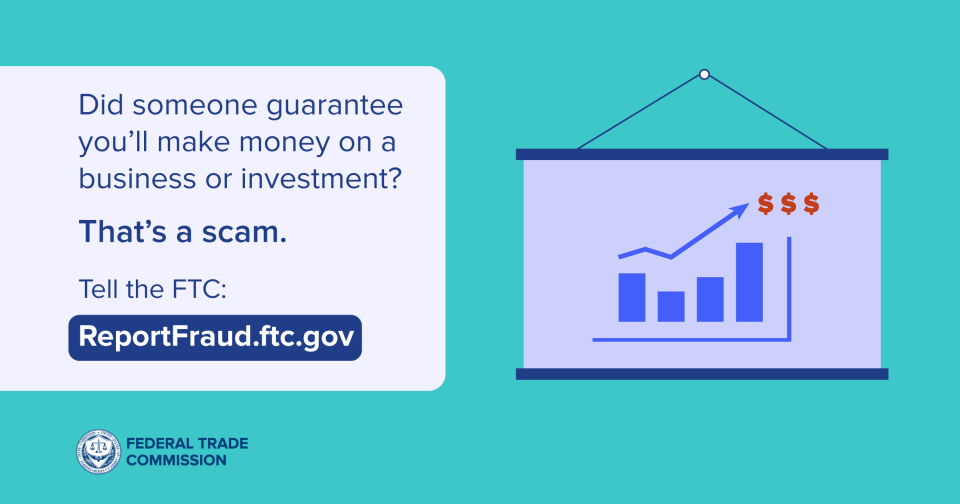According to the FTC, the operators of Blueprint to Wealth promised new members would earn big money — making over $20,000 a month — from an “everything-is-done-for-you” business opportunity with support from “success coaches.” They made it sound easy and risk free: pay up to $21,000 for a membership plus advertising costs, then sit back, let the coaches handle everything else, and watch the money roll in from commissions generated by new membership sales. But, says the FTC, the scheme generated millions only for the defendants. People who purchased memberships typically got nothing. When people complained, Blueprint to Wealth blamed them for not doing enough — and then tried to convince them to pay even more money to generate income.
To avoid a business coaching or recruitment-based business opportunity scam, take these steps before you pay:
- Take your time and talk to someone you trust. Scammers will try to pressure you to get involved right away. Talk to someone you trust — a friend, a family member, a neighbor — before you sign up. Talking about it could help you realize it's a scam.
- Research the company and offer online. Use words like “complaint”, “review”, or “scam” to see what people say about it before you pay.
- Question promises of big money or profits. All investments have risks. Only scammers guarantee success or a return on an investment.
- Read success stories and reviews with skepticism. They might be fakes or misleading. Look at different sources and well-known websites for trustworthy and impartial expert reviews.
Learn more about avoiding a business coaching scam. If you think you’ve spotted one, tell the FTC at ReportFraud.ftc.gov.


Thanks for your sharing and support for our community. I think this is a very important decision to make about scammers. Thanks again.
Thank you!
Along with the listed steps, a main rule of thumb would be to avoid anything where success depends on recruiting ever more participants. The first ones will make some money but it's basically a Ponzi scheme.
I appreciate all the information you provide for us. Thank you for always keeping us updated. Happy Holidays 🙌
Does this advice apply to online dietary supplement companies?
In reply to Does this advice apply to… by Andrew Mays
For sure. Herbalife comes to mind, where just concluded their 2017 class action lawsuit earlier this year, 2023, where the action class claimed huge losses. They only got some of their money back through the lawsuit from what I understand.
The company Primerica (MLM) is a perfect example of... how to make money working from home and using false promises and claims to support it. Many reps use Indeed to recruit under false pretense of selling life insurance and or financial services. Along with the promise of warm leads from the company. All false by the way.
I got scammed to the tune of $5,000, (which I could not afford) by Trump University. Never saw a dime back. They said they would teach me how Trump made his money in real estate. All a rip off.